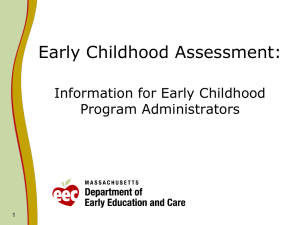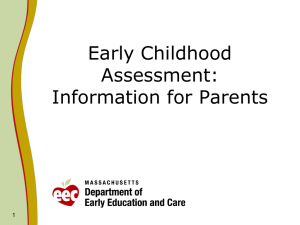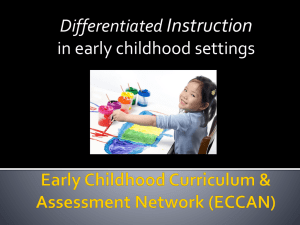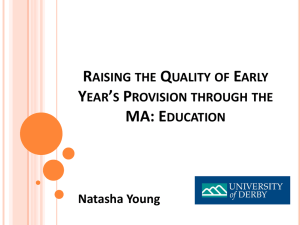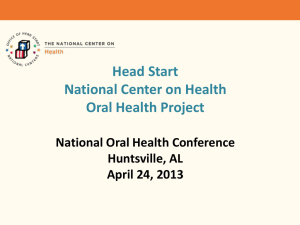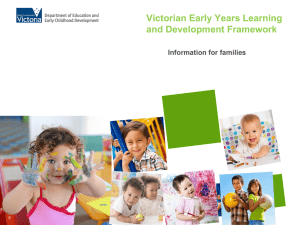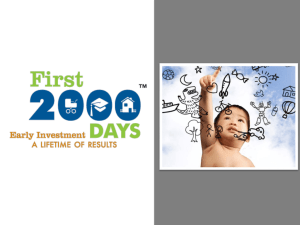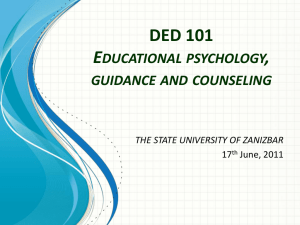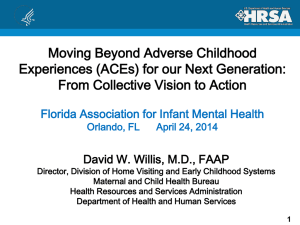What is Early Childhood Assessment?
advertisement
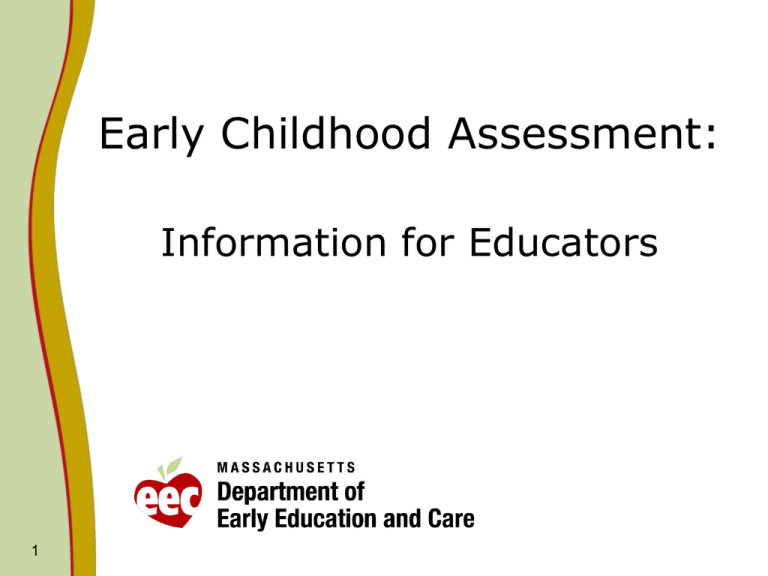
Early Childhood Assessment: Information for Educators 1 Overview 2 What and why it is important Early Childhood vs. K-12 assessment Types of child assessment systems Training opportunities Equipment, materials, resources Parent Involvement Role of Massachusetts Department of Early Education and Care What is Early Childhood Assessment? 3 Process of observing, recording, and documenting work of children Allows educators to make the best decisions for the child Methods can include standardized tests observations, child portfolios, teacher or parent checklists and child-parent interviews Child screening vs. assessment Why is Early Childhood Assessment Important? Increasing attention to how children are progressing Measuring young children’s progress is different from other ages Improves interactions and teaching Identifies children with special needs 4 What about a child is assessed? 5 Emotional/Social: expressing feelings, forming friendships, resolving conflicts with others Language: listening and talking Physical: using pencils (fine motor skills), climbing and running (gross motor skills) Cognitive: numbers, colors, and patterns Approaches to Learning: curiosity and excitement about learning and ways of learning new information How does early childhood assessment differ from K-12th grade assessment? 6 K – 12th grade assessment places emphasis on academic knowledge Early childhood assessment places emphasis on all aspects of a child’s development How does early childhood assessment differ from K-12th grade assessment continued… 7 K-12th grade assessment uses mainly tests, quizzes and standardized tests. Early childhood assessment uses child observations, developmental checklists and child portfolios Both are used to guide decisions about… * Child interventions * Resources Types of Child Assessment Systems Program-developed child assessment tools *Pros *Cons 8 Types of Child Assessment Systems cont… Published (or packaged) child assessment tools *Pros *Cons 9 Training Opportunities on Early Childhood Assessment 10 Opportunities for staff to better understand early childhood assessment * College courses * Training by publishers * Offerings through local Child Care Resource and Referral Agency * EEC Professional Development calendar: www.eec.state.ma.us/ProfessionalDev elopment/WebFindTraining.aspx Suggested Equipment, Materials, and Resources 11 Equipment: computer, printer, digital camera, high-speed internet Materials: notebooks for portfolios, photo paper, paper, clip boards, post-it notes Resources: assessment tool-kits, books/articles on early childhood assessment How can Parents be Involved in the Early Childhood Assessment Process? 12 Enrollment On-site developmental screenings Parent Checklists Parent/Teacher conferences What is Massachusetts currently doing around early childhood assessment? Universal Pre-Kindergarten Pilot Project * 13 Assessment Planning Grants More information: www.eec.state.ma.us UPK Eligible Child Assessment Tools 14 Creative Curriculum’s Developmental Continuum or CreativeCurriculum.net Work Sampling System High Scope Child Observation Record Ages and Stages Questionnaire In closing… 15 Suggested articles specific to early childhood assessment Contact at the Dept. of Early Education and Care: Jennifer Louis Dept. of Early Education and Care 51 Sleeper St., 4th Floor Boston, MA 02210 (617)988-6640 Jennifer.Louis@state.ma.us

